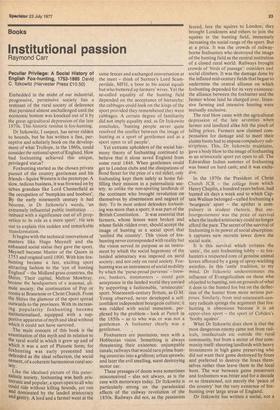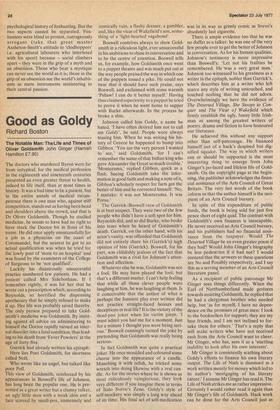Books
Institutional passion
Raymond Carr
Peculiar Privilege: A Social History of English Fox-hunting, 1753-1885 David C. ltzkowitz (Harvester Press £10.50) Embedded in the midst of our industrial, progressive, permissive society lies a remnant of the rural society of deference that persisted almost unchallenged until the economic bottom was knocked out of it by the great agricultural depression of the late 1870s. This historic residue is fox-hunting.
Dr Itzkowitz, I suspect, has never ridden to hounds, but he has written a fine, perceptive and scholarly book on the development of what Trollope, in the 1860s, could consider the national sport of England. How had foxhunting achieved this unique, privileged status?
Foxhunting started as the chosen private pursuit of the country gentleman and his friends— Squire Western is the prototype. A slow, tedious business, it was frowned on by urban grandees like Lord Chesterfield as the occupation of 'bumpkins and boobies'. By the early nineteenth century it had become, in Dr Itzkowitz's words, 'an extremely influential public institution . . . imbued with a significance out of all proportion to its role as a mere sport'. He sets out to explain this sudden and remarkable transformation.
It begins with the technical innovations of masters like Hugo Meynell and the enhanced social status they gave the sport. Meynell became Master of the Quorn in 1753 and reigned until 1800. With him foxhunting became a fast, exciting sport attracting fashion to the `eye of hunting England' — the Midland grass countries, the Shires. Their capital, Melton Mowbray. became the headquarters of a seasonal, allmale society, the continuation of Pop or rooms at Brasenose or Christ Church. From the Shires the glamour of the sport spread outwards to the provinces. With its increasing popularity foxhunting became Institutionalised, equipped with a supportive apparatus of myth and ideal without Which it could not have survived.
The main concern of this book is the examination of this myth and its relation to the rural world in which it grew up and of Which it was a sort of Platonic form; for foxhunting was early presented and defended as the ideal reflection, the social cement, of a coherent harmonious rural soc iety.
Like the idealised picture of this paternalistic society, foxhunting was both aristocratic and popular, a sport open to all who could ride without killing hounds,. yet run and dominated by the landed aristocracy and gentry. A lord and a farmer went at the same fences and exchanged conversation at the meet — think of Surtees's Lord Scamperdale, MFH, a boor to his social equals but who buttered up farmers' wives. Yet the so-called equality of the hunting field depended on the acceptance of hierarchy: the cabbages could look on the kings of the sport provided they remembered they were cabbages. A certain degree of familiarity did not imply equality and, as Dr ltzkowitz concludes, 'hunting people never quite resolved the conflict between the image of hunting as a sport of gentlemen and as a sport open to all people'.
Yet extreme upholders of the social harmony theory of foxhunting continued to believe that it alone saved England from some rural 1848. When gentlemen could get to London clubs and the dissipations of Bond Street for the price of a rail ticket, only foxhunting kept them safely at home fulfilling their mission in a paternalistic society, so unlike the non-sporting landlords of the continent who brought revolution on themselves by absenteeism and neglect of duty. To its most ardent defenders foxhunting was more than a sport; it was part of the British Constitution. It was essential that farmers, whose fences were broken and whose fields ridden over, should accept the image of hunting as a social sport that 'unified the country'. This vision of foxhunting never corresponded with reality but the vision served its purpose as an instrument by which the social hegemony of the landed aristocracy was imposed on r.ural society; and not only on rural society. Foxhunting was an instrument of social mobility by which the 'purse-proud parvenus' — brewers, bankers, ironmasters — could gain acceptance in the landed world they envied by supporting a fashionable, 'aristocratic' sport. Nineteenth-century Britain, as G.M. Young observed, never developed a selfconfident independent bourgeois culture; it was riddled with social mimetism, perplexed by the problem — look at Punch in the 1850s — as to who was or was not a gentleman. A fox hunter clearly was a gentleman.
Foxhunters are pessimists, men with a Hobbesian vision. Something is always threatening their existence: unjumpable canals; railways that would turn prime hunting countries into a gridiron; urban sprawls; and later the evil smelling, scent destroying motor car.
These presages of doom were sometimes misconceived — alas not always, as is the case with motorways today. Dr Itzkowitz is particularly strong on the paradoxical effects of the railway revolution of the 1850s. Railways did not, as the pessimists feared, lure the squires . to London; they 'brought Londoners and others to join the squires in the hunting field, immensely increasing the social range of the sport. But at a price. It was the crowds of railwayborne foxhunters who destroyed the image of the hunting field as the central institution of a closed rural world. Railways brought crowds of 'birds of passage': outsiders and social climbers. It was the damage done by the inflated mid-century fields that began to undermine the central alliance on which foxhunting depended for its very existence: the alliance between the foxhunter and the farmer whose land he charged over. Intensive farming and intensive hunting were mutually exclusive.
The real blow came with the agricultural depression of the late seventies when farmer and landlord alike felt the pinch of falling prices. Farmers now claimed compensation for damage and to meet their claims hunts had to impose compulsory subscriptions. This, Dr ltzkowitz maintains, gave a body blow to the image of foxhunting as an aristocratic sport yet open to all. The Edwardian Indian summer of foxhunting was based on hard cash; and it was exclu sive. • In the 1970s the President of Christ Church JCR — the college from which Henry Chaplin, a hundred years before, had hunted six days a week and to which Captain Wallace belonged — called foxhunting a 'bourgeois' sport — the epithet is compulsory in student rhetoric. But embourgeoisement was the price of survival when the landed aristocracy could no longer afford the pace. The secret of the survival of foxhunting is its power of social absorption: it captures new recruits lower down the social scale.
It is this survival which irritates the 'antis', the anti foxhunting lobby — to foxhunters a respected core of genuine animal lovers afforced by a gang of spray-wielding weirdies. In this .antis' tradition, to my mind, Dr Itzkowitz underestimates the influence of Evangelicalism on those who objected to hunting, not on grounds of what it does to the hunted fox but on the deflection of the hunter from more serious purposes. Similarly, from mid-nineteenth-century radicals springs the argument that foxhunting is obnoxious because it is an upper-class sport — the sport of Cobden's 'booby squires'.
What Dr Itzkowitz does show is that the most dangerous enemy came not from radicals, intellectuals etc outside the rural community, but from a sector of that community itself: shooting landlords with heavy investments in high game preserving who did not want their game destroyed by foxes and preferred to destroy the foxes themselves rather than leave them to the local hunt. The war between game preservers and foxhunters was bitter and for a decade or so threatened, not merely the 'peace of the country' but the very existence of foxhunting over large areas of England.
Dr Itzkowitz has written a social, not a psychological history of foxhunting. But the two aspects cannot be separated. Foxhunters were blind to protest, outrageously arrogant (take that great master Assheton-Smith's attitude to 'clodhoppers' i.e. agricultural labourers who interfered with his sport) because — social climbers apart — they were in the grip of a myth and an obsession. Those who bear a mystique can never see the world as it is; those in the grip of an obsession see the world's inhabitants as mere instruments ministering to their central passion.







































 Previous page
Previous page